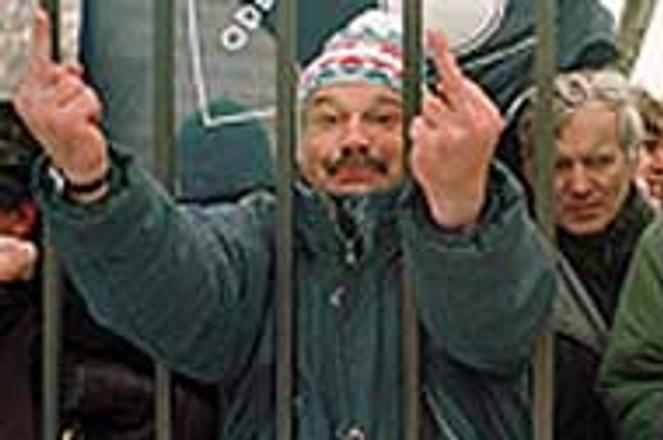2,500 KOZ workers protest in front of government office in Bratislava on February 12.photo: TASR
At the turn of the 20th century, Slovak citizens may not be as well-paid as they were in 1989, but they may also be a lot better-off than they believe.
According to economic results for the third quarter of 1999 released in early December by the Slovak Statistics Office, real wages declined from July to September by 6% from the same period in 1998. People's falling purchasing power was reflected in the fact that household consumption was down 1.4% in the same period after a growth of 1.1% and 1.5% in the first two quarters of the year.
Despite the gloomy figures, economic analysts said that people had not been as badly affected by the year's price hikes and economic 'austerity packages' as had been feared in January.
"The economy is growing quite well despite these austerity measures, which typically slow down investments and reduce consumption," said Tomáš Kmeť, a macro-economic analyst for the SLSP state bank.
Kmeť added that given the still-bouyant domestic consumption figures, the austerity packages approved by the government in January and May could clearly have been more harsh. "However, we're also talking unions and politics here, which makes taking any tough measures a very delicate issue."
Martin Barto, head of strategy at SLSP, agreed that the country's economic situation was generally positive. Citing a third quarter GDP growth of 0.6%, Barto said that the slight increase had been defined by a 4.7% slump in domestic demand and a 5% growth in external demand, ultimately a positive development.
"The result [in the third quarter] was a slowing down of GDP growth [from 2.9% in the second quarter], but the structure of GDP consumption is better because it was driven by external demand, which is very positive," Barto said, adding that Slovakia is one of the few post-communist countries where real GDP is higher now than it was in the pre-1989 era.
Notwithstanding the country's post-1989 GDP growth, real wages are still only about 90% of what they were in 1989, according to the Statistical Office. But again, analysts said that the raw data did not tell the whole story.
Ján Tóth, a senior analyst with the Dutch investment bank ING Barings, said that due to Slovakia's healthy 'grey market' (where people earn money that they do not claim on their income tax statements), people may be earning considerably more now than is believed. Tóth estimated that the grey market is about one third the size of the Slovak economy, or about 230 billion Slovak crowns ($5.5 billion) in current prices.
Tóth estimated, for instance, that about 70,000 people claiming unemployment benefits are actually working on the side.
"Statistics [as a measure of the true standard of living] do not take into account issues like an increase in the quality of products, or the fact that you don't have to wait in line for products, or that you can travel," he added.
Many people on the streets, however, have a much more jaundiced view of their economic situations.
Andrej Melicher, a 70 year-old former bus driver from Bratislava, said he enjoyed the newfound freedom under Slovakia's post-communist governments, but found little solace in the economy that went with them.
"For 40 years under communism, we were paying money into a pension fund. And now all I receive for my work is 4,000 crowns [$95] in pension per month, which is desperately little," he said.
A 69 year-old former secondary school teacher, who chose to remain anonymous, also enjoyed the new freedoms capitalism has provided, but held a grim view regarding the state of the economy.
"The economic situation has worsened and living standards have dropped dramatically, and my husband and I don't know when it will stop," she said.
On the other hand, Martin Máčaj, a self-employed 27 year-old with his own legal firm, felt there couldn't be a better time to be living and working in Slovakia.
"The situation has changed dramatically for the better, but in 1989 I was just 17 so I really didn't have any position in society. For the future, I hope that society will develop quickly and be as good for others as it was for me," he said.
Barto, for his part, said that it was in the nature of capitalist societies that many people were not pleased with their situations.


